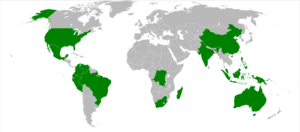 Image via Wikipedia
Image via Wikipedia ABS Working Group 9 Further Resumed
Inter-regional Negotiating Group (ING) Meeting
Montreal, Canada
18 September 2010
CBD Parties Come to Tentative Agreement on Utilization of Genetic Resources
Seventy-six Contracting Parties to the Convention on Biological Diversity (CBD) attending the Inter-regional Negotiating Group (ING) meeting here in Montreal, Canada today came to a tentative agreement on the definition of the word “utilization” of genetic resources, part of a series of measures that is aimed at putting to rest the long-running dispute among developed and developing countries on the sharing of benefits arising from the use of the world's biodiversity.
“We hope you can live with a general consensus...this is a very strong step forward”, said Fernando Casas, Co-Chair of the ING, as he quipped that the ING will eventually come back to the use of terms in Article 2, when every other key item in the draft ABS Protocol.
What was agreed so far by the Parties to the ING is to place the word “utilization” as part of art. 2 of the draft ABS Protocol which can now pave the way for the deletion of the word “derivatives” scattered in various provisions in the emerging international treaty that is expected to stop biopiracy.
The agreement was tentative because developed countries such as Canada, EU, New Zealand, Japan and Switzerland kept on repeating as part of their acceptance of the definition that they will still fine-tune the language of the definition especially when the term is to be used in other parts of the ABS Protocol, like in the provision on access, fair and equitable sharing of benefits, TK andcompliance.
This definition of the word “utilization” has been agreed upon by a small group called by the Co-Chairs of the Working Group which worked on this text last July 2010 and is part of the so-called “core of the core” issues that once resolved should also lead to an agreement on many issues involving the sharing of benefits arising from the use of biodiversity. .
This text however was not yet incorporated in the body of the draft ABS Protocol coming out from that July 2010 meeting of the ABS Working Group, and it was then, still a footnote.
The text on “utilization” has been extensively discussed in the afternoon going into the night, as some Parties were asked by GRULAC (Latin American and Caribbean group of countries, one of the key UN regional groups) member countries to withdraw their text proposals that would have included the terms “chemical”, “breeding and selection” and the inclusion of a broad enumeration of what constitutes a list of typical uses of genetic resources in Annex 2 of the draft on utilization as proposed by South Africa and the phrase “taking into account emerging and future technologies involving genetic resources” made by Philippines in the interest of letting developed countries agree to a emerging text, which in turn was considered by Japan, EU, Canada and Australia as a major advance in the negotiations.
Australia tried to stall saying this is a weekend in their capital including New Zealand and said that they will again consult their capital about this emerging consensus and suggested a bracketing of the text which was met by a simultaneous raising of flags by all countries in the Africa, Asia Pacific and GRULAC region to queue up in the speaker's list to respond to Australia.
This trick by Australia was refused by the Co-Chair at this time assuring her that Parties in the ING will have to go back to this emerging agreement on the text when they revisit art. 2 on the use of terms in the last negotiating day of this session on Tuesday, 21 September.
Given this impasse, the Co-chairs decided to move on to other topics, particularly article 4 on the fair and equitable sharing of benefits.
The discussion on art. 4 however also got stuck when there were sharp differences of opinion between developed and developing countries on the provision that “every” utilization of genetic resources should give rise to an obligation to share benefits as according to Canada this obligation is too “imperative” and thus will cause it a lot of difficulties aside from its observation that it is not what is found in the text of the Convention.
The Philippines responded to this comment saying that this is what has been missing since the time the CBD took effect in 1993, that there has been no benefits shared to developing countries as the text of the CBD, while mentioning fair and equitable sharing of benefits, still had to require the execution of contracts which is called “mutually agreed terms” in the Convention and the taking of various “legislative, policy and administrative” measures when in reality very few countries have legislation or any other measure in place to ensure benefit-sharing and that most utilization of genetic resources, particularly in the classic sense of the term 'biopiracy” has been without any contracts.
Malaysia expressed broad support to the formulation in Article 4 since it explicitly sets out the fact of the obligation which is to share benefits for “every” utilization of genetic resources and that it also spells out with whom it must be shared which is with countries of origin of the genetic resources and that this is to be shared through the mechanism of mutually agreed terms or contracts.
India and Peru however expressed their contentment in deleting the word “every” for the obligation to share benefits as to them the more important concept is that these benefits must be shared with “countries of origin” of these genetic resources.
The EU has a completely different view of the matter, citing art. 15.7 of the Convention on Biological Diversity which states that it is the providing countries that will be sharing these benefits.
The view of the developing countries is that in art. 15.3 of the same Convention, the genetic resources being referred to in the Convention are 'those that are provided by Contracting Parties that are countries of origin of such resources or by the Parties that have acquired the genetic resources in accordance with this Convention.
The problem with the concept of “providing country” is that this can be an excuse for those countries that are not the countries of origin of the genetic resources but nonetheless have these resources in abundance, like the former colonial masters UK, or Netherlands or the US who collected genetic resources throughout its history with its colonies, to claim benefits each time they also provide access to these genetic resources.
The countries who are the countries of origin of most of these resources claim otherwise, saying that if this notion of benefits accruing to countries of origin is not enshrined in the draft ABS Protocol then it would be a hollow instrument without any significance to the generation of benefits which should contribute to the conservation and sustainable use of biodiversity.
Co-Chair Fernando Casas decided to break at around 11pm for countries to further reflect on the interventions made, saying that countries are near agreement on these issues, perhaps a night's rest might enable countries find a compromise on these variant positions.
Earlier in the day, the ING also tackled the institutional provisions of the draft ABS Protocol, from Art. 20 to 31, coming to agreement on most of the bracketed text, only disagreeing on how the Meeting of the Parties to the Protocol would hold its first meeting side by side with the Conference of the Parties to the Protocol as Egypt was insisting that this meeting should not be held together in time as one-person delegations particularly from developing countries would have a hard time attending if both meetings will happen at the same time.
There is however bracketed language here from either “held together” or “in conjunction” and it is the EU that is raising an issue of legal ambiguity if the word “in conjunction” is used, as that phrase was lifted from the Cartagena Protocol on Biosafety, the said Protocol being an international instrument also arising from the Convention on Biological Diversity.
The Philippines however was alone in its proposal to set up a stand-alone provision on non-compliance, calling for the establishment of a subsidiary body on implementation.
The view of the Megadiverse Countries on this on the sidelines is that this is a matter best left to the Meeting of the Parties.
The Co-Chairs left is as such for the meantime as this is the only remaining bracketed text on the provisions on institutional provisions aside from the other one mentioned earlier where the EU and Egypt had differing views.
Over-all, while very slow, the ING has made some progress on its opening day of session, which was made possible through the generous donation of support by Japan, Norway, Germany and Switzerland.
oOo



![Reblog this post [with Zemanta]](http://img.zemanta.com/reblog_e.png?x-id=3849d6f8-8762-414a-a9f1-d904a8921b8e)



![Reblog this post [with Zemanta]](http://img.zemanta.com/reblog_e.png?x-id=13cad73d-b2f3-4c8c-a1ba-c31cc88ba361)

![Reblog this post [with Zemanta]](http://img.zemanta.com/reblog_e.png?x-id=a3e670a8-84b7-46e8-9196-bda7f904d986)


